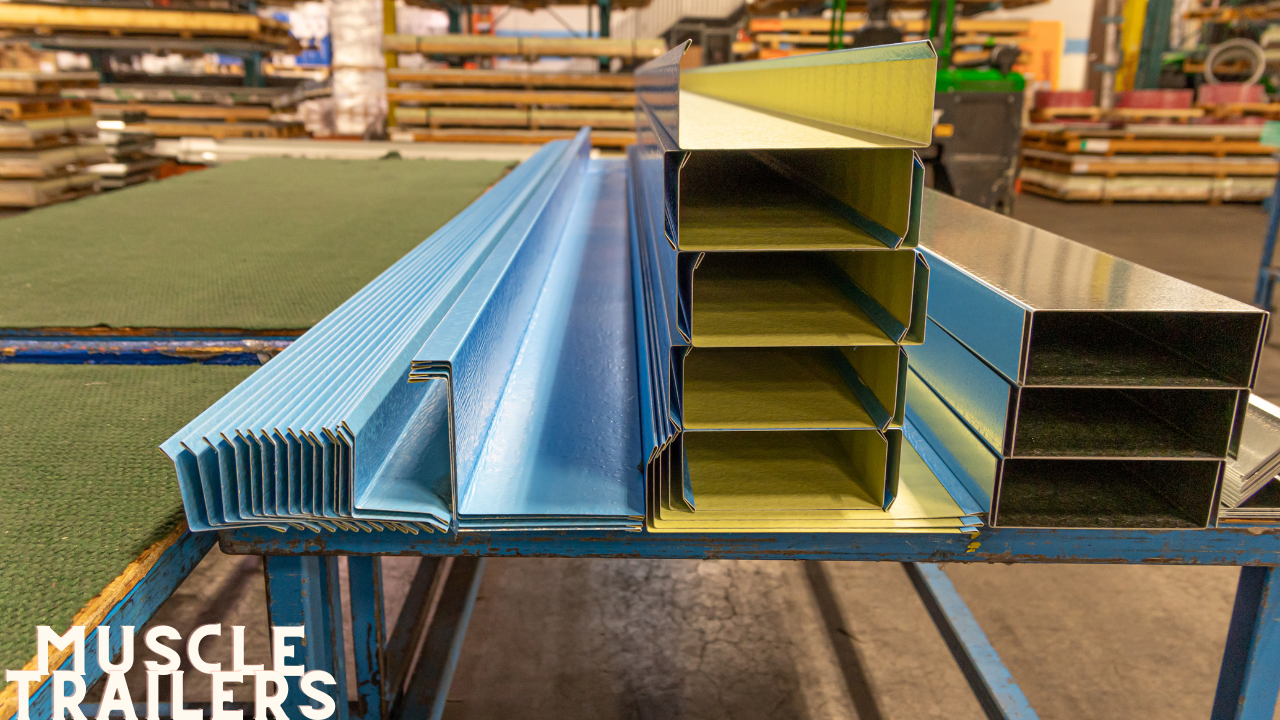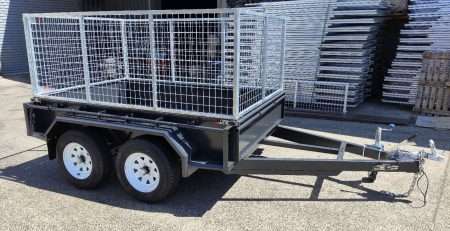
Unlocking Peace of Mind: Galvanised Trailer Safety Solutions Revealed
The Importance of Galvanised Trailer Safety
When it comes to galvanised trailers, safety should always be a top priority. Whether you’re using galvanised boat trailers, galvanised utility trailers, or any other type of galvanised trailer, ensuring the safety of both the cargo and other road users is crucial.
Why Safety is Crucial for Galvanised Trailers
Safety is paramount when it comes to using galvanised trailers. Not only does it protect your valuable cargo, but it also reduces the risk of accidents on the road. By following proper safety guidelines and implementing essential safety features, you can minimise the chances of damage to your trailer, prevent injuries, and ensure a smooth and worry-free towing experience.
Common Safety Concerns with Trailers
There are several common safety concerns that trailer owners should be aware of. These include:
- Overloading: Overloading a trailer can put excessive strain on the vehicle and compromise its stability, leading to accidents or breakdowns. It is important to adhere to the weight limits specified by the manufacturer and ensure proper weight distribution to maintain balance.
- Inadequate braking: Proper braking systems are essential for safe trailer operation. Inadequate or faulty brakes can result in longer stopping distances and reduced control, posing a significant safety risk.
- Poor visibility: Limited visibility is a common issue with trailers, especially when towing larger loads. Insufficient lighting or improperly positioned lights can make it difficult for other drivers to see your trailer, increasing the risk of collisions.
- Inadequate maintenance: Neglecting regular maintenance and inspections can lead to various safety issues, such as tyre blowouts, wheel bearing failures, or hitch malfunctions. Regular cleaning, rust prevention, and thorough inspections are essential to keeping your trailer in optimal condition.
By addressing these common safety concerns and implementing proper safety measures, you can enhance the safety of your galvanised trailer and enjoy peace of mind during your towing adventures.
In the next sections, we will explore the different aspects of galvanised trailer safety, including essential safety features, maintenance and inspection tips, and safe towing practices. Stay tuned to learn more about how to unlock peace of mind with galvanised trailer safety.
Understanding Galvanised Trailers
To fully appreciate the importance of galvanised trailer safety, it’s essential to understand what galvanised trailers are and the benefits they offer.
What are Galvanised Trailers?
Galvanised trailers are trailers that have undergone a galvanisation process. Galvanisation involves coating the trailer’s metal components, such as the frame and chassis, with a protective layer of zinc. This process helps to prevent corrosion and rust, ensuring the longevity and durability of the trailer.
The galvanisation process typically involves immersing the trailer components in a bath of molten zinc. This creates a metallurgical bond between the zinc and the metal, forming a protective barrier that shields the trailer from the damaging effects of moisture, salt, and other environmental factors.
Benefits of Galvanised Trailers
The use of galvanised trailers offers several advantages, especially when it comes to safety and longevity. Here are some benefits:
- Corrosion Resistance: The galvanised coating acts as a robust shield against corrosion, protecting the trailer from rust and deterioration. This is particularly important for trailers that are exposed to harsh weather conditions or frequent contact with water, such as galvanised boat trailers.
- Durability: Galvanised trailers are known for their exceptional durability. The zinc coating provides a strong and long-lasting barrier against scratches, impacts, and abrasions. This makes them suitable for various applications, including galvanised utility trailers that endure heavy loads and demanding tasks.
- Low Maintenance: Compared to trailers without galvanised coatings, galvanised trailers require less maintenance. The zinc coating helps to reduce the need for frequent repainting or touch-ups, saving both time and money in the long run. Regular galvanised trailer maintenance is still recommended to ensure optimal performance.
- Extended Lifespan: The galvanised coating significantly extends the lifespan of trailers. By providing a protective barrier against corrosion, galvanised trailers can withstand the test of time and offer many years of reliable service. This makes them a cost-effective choice for businesses and individuals alike.
- Versatility: Galvanised trailers are available in a wide range of types and configurations, catering to various needs and applications. Whether you require galvanised box trailers, galvanised car trailers, or galvanised tandem trailers, there are options to suit your specific requirements.
Galvanised trailers offer enhanced safety and peace of mind due to their exceptional corrosion resistance, durability, and low maintenance requirements. By choosing a galvanised trailer, you’re investing in a reliable and long-lasting transportation solution that can withstand the demands of various industries and applications. It’s important to note that while galvanised trailers provide excellent protection against corrosion, regular maintenance and adherence to galvanised trailer regulations are still vital to ensure optimal performance and safety.
Essential Safety Features for Galvanised Trailers
When it comes to galvanised trailers, safety should always be a top priority. These trailers are designed to withstand various conditions and provide reliable transportation. Here are some essential safety features to consider when choosing a galvanised trailer:
Sturdy Construction and Durability
One of the key safety features of a galvanised trailer is its sturdy construction and durability. Galvanised trailers are built using high-quality materials and undergo a galvanisation process that adds a protective layer to the trailer’s surface. This galvanised coating helps to prevent corrosion, rust, and damage caused by exposure to the elements.
By choosing a galvanised trailer with robust and durable construction, you can have peace of mind knowing that it can handle heavy loads and rough terrain without compromising safety.
Reliable Braking Systems
Another crucial safety feature to consider in a galvanised trailer is a reliable braking system. A well-functioning braking system ensures that you can stop your trailer safely and effectively, especially when towing heavy loads.
There are different types of braking systems available, including electric brakes, hydraulic brakes, and mechanical brakes. Each system has its advantages, so it’s important to choose one that suits your specific needs and preferences. Regular maintenance and inspections of the braking system are essential to ensuring its reliability and effectiveness.
Proper Lighting and Visibility
Proper lighting and visibility are essential for safe towing with a galvanised trailer. The trailer should be equipped with functional lights, including brake lights, turn signals, and reflectors. These lights ensure that other drivers on the road can see your trailer and anticipate your movements.
Additionally, the trailer should have reflective tape or markings to enhance visibility, especially in low-light conditions. Regularly check and maintain the lighting system to ensure that all lights are working correctly and replace any faulty bulbs or wiring promptly.
To ensure the safety of yourself and others on the road, it’s crucial to adhere to all traffic regulations and guidelines when towing a galvanised trailer. Properly maintaining and inspecting your trailer, following safe loading and weight distribution practices, and driving responsibly will contribute to a safe towing experience.
By considering these essential safety features, you can select a galvanised trailer that provides the durability, reliability, and visibility necessary for safe transportation. Remember to regularly inspect and maintain your trailer to address any potential safety concerns promptly.
Maintenance and Inspection Tips
To ensure the safety and longevity of your galvanised trailer, regular maintenance and inspections are essential. By following these tips, you can help prevent potential issues and keep your trailer in optimal condition.
Regular Cleaning and Rust Prevention
Cleaning your galvanised trailer regularly helps to remove dirt, debris, and corrosive substances that can lead to rust and damage. Use a mild detergent and water solution to clean the trailer, paying special attention to the undercarriage and hard-to-reach areas. Avoid using abrasive materials or harsh chemicals that may damage the galvanised coating.
After cleaning, thoroughly dry the trailer to prevent water from pooling and causing rust. Applying a protective coating or wax specifically designed for galvanised surfaces can further enhance rust prevention and prolong the life of your trailer.
Checking Tires and Wheel Bearings
Properly functioning tires and wheel bearings are crucial for safe and smooth trailer operation. Regularly inspect the condition of your tires, including tread wear, signs of damage, and proper inflation. Ensure that the tires are suitable for the load capacity of your trailer and replace them if necessary.
In addition to tires, check the wheel bearings for any signs of wear or damage. Properly greased and functional wheel bearings allow for smooth wheel rotation and reduce the risk of overheating or wheel failure. If you notice any issues with the tires or wheel bearings, consult a professional or refer to our article on galvanised trailer maintenance for further guidance.
Inspecting Hitch and Coupling
The hitch and coupling play a critical role in connecting your trailer to the towing vehicle. Regularly inspect these components for any signs of wear, damage, or misalignment. Ensure that the hitch and coupling are securely fastened and properly lubricated to facilitate smooth movement.
Check for any loose bolts or connections and tighten them as needed. If you notice any significant damage or issues with the hitch or coupling, it is important to address them promptly to avoid potential accidents or trailer detachment while in transit.
By following these maintenance and inspection tips, you can keep your galvanised trailer in optimal condition and ensure its safety on the road. Remember to consult the manufacturer’s guidelines and refer to our article on galvanised trailer specifications for specific maintenance recommendations. Regular care and attention to detail will help you maximise the lifespan of your galvanised trailer and enjoy worry-free towing experiences.
Safe Towing Practices
When towing a galvanised trailer, it’s essential to follow safe practices to ensure the stability and security of both the trailer and the load. Here are some important considerations for safe towing:
Proper Loading and Weight Distribution
Properly loading and distributing the weight on your galvanised trailer is critical for safe towing. It’s important to distribute the weight evenly across the trailer to maintain balance and stability. Uneven weight distribution can lead to swaying, reduced control, and potential accidents.
To achieve proper weight distribution, place heavier items at the front of the trailer, closer to the hitch. This helps to maintain stability and prevent the trailer from becoming too front-heavy or rear-heavy. Additionally, avoid overloading the trailer beyond its maximum capacity, as this can compromise its structural integrity and handling.
Securely Fastening the Load
Securing your load is crucial to prevent any shifting or falling during transit. Before hitting the road, ensure that all items on the trailer are tightly secured. Use appropriate tie-down straps, ropes, or bungee cords to secure the load, making sure they are properly tensioned and all connections are secure.
Consider using additional safety measures such as cargo nets or tarpaulins to provide an extra layer of protection and prevent debris from falling off the trailer. Regularly check the load during stops to ensure everything remains secure.
Safe Driving Techniques when Towing a Trailer
Proper driving techniques are essential when towing a galvanised trailer. Here are some tips to help you navigate the roads safely:
- Maintain a safe and legal speed. Driving at a reasonable speed reduces the risk of accidents and allows you to maintain better control over the trailer.
- Increase your following distance. Towing a trailer requires more time and distance to come to a complete stop, so maintain a safe distance from the vehicle ahead.
- Be cautious when changing lanes or merging. The additional length and weight of the trailer can affect your vehicle’s maneuverability. Use your mirrors and signals effectively and make smooth, controlled lane changes.
- Take turns wider. Trailers have a larger turning radius, so make wider turns to avoid cutting corners and potentially hitting curbs or other obstacles.
- Be mindful of wind conditions. High winds can affect the stability of the trailer. Reduce your speed and maintain a firm grip on the steering wheel to counterbalance any gusts.
- Practice smooth acceleration and braking. Abrupt acceleration or braking can cause the trailer to sway or jackknife. Gradually apply the brakes and accelerate to minimize any sudden movements.
- Stay alert and anticipate road conditions. Keep an eye out for potholes, speed bumps, or uneven road surfaces that can affect the trailer’s stability. Adjust your driving accordingly to maintain control.
By following these safe towing practices, you can ensure a smooth and secure journey with your galvanised trailer. Remember to always refer to the manufacturer’s guidelines and local regulations for specific towing recommendations. For more information on galvanised trailers, including their construction and features, check out our article on galvanised trailer features.
Author
I am Rahatul Ashiq Tamal. Another author of Muscle Trailers. Muscle Trailers is a well-known trailer brand in Sydney, Melbourne & Adelaide

How to Mount a Spare Tire on Your Trailer: A Simple Step-by-Step Guide
Trailer service centers receive over 1 million phone calls and 1.3 million emails each year about trailer maintenance problems....

How to Fix RV Roof Leaks: Simple Roof Leak Detection Guide for Beginners
Did you know DIY RV roof repairs can cost under $50? But undetected leaks could lead to substantially higher repair...

Starting a Food Truck Business in Australia: From Trailer Selection to Launch
The Australian mobile food market has evolved into a billion-dollar industry. This makes a food truck...
